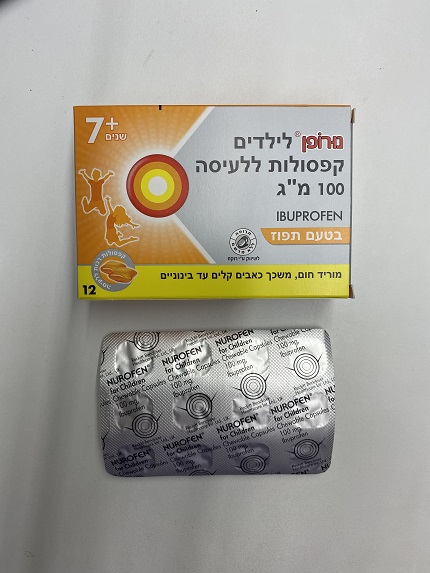Quest for the right Drug

נורופן לילדים קפסולות ללעיסה 100 מ"ג NUROFEN FOR CHILDREN CHEWABLE CAPSULE 100 MG (IBUPROFEN)
תרופה במרשם
תרופה בסל
נרקוטיקה
ציטוטוקסיקה
צורת מתן:
פומי : PER OS
צורת מינון:
אין פרטים : SOFT CHEWABLE CAPSULE
עלון לרופא
מינוניםPosology התוויות
Indications תופעות לוואי
Adverse reactions התוויות נגד
Contraindications אינטראקציות
Interactions מינון יתר
Overdose הריון/הנקה
Pregnancy & Lactation אוכלוסיות מיוחדות
Special populations תכונות פרמקולוגיות
Pharmacological properties מידע רוקחי
Pharmaceutical particulars אזהרת שימוש
Special Warning עלון לרופא
Physicians Leaflet
Interactions : אינטראקציות
4.5 Interaction with other medicinal products and other forms of interaction Ibuprofen should be avoided in combination with: • Aspirin: Unless low-dose aspirin (not above 75mg daily) has been advised by a doctor, as this may increase the risk of adverse reactions (See section 4.4). Experimental data suggest that ibuprofen may inhibit the effect of low dose aspirin on platelet aggregation when they are dosed concomitantly. However, the limitations of these data and the uncertainties regarding extrapolation of ex vivo data to the clinical situation imply that no firm conclusions can be made for regular ibuprofen use, and no clinically relevant effect is considered to be likely for occasional ibuprofen use (see section 5.1). • Other NSAIDs including cyclooxygenase-2 selective inhibitors: Avoid concomitant use of two or more NSAIDs as this may increase the risk of adverse effects (see section 4.4). Ibuprofen should be used with caution in combination with: • Anticoagulants: NSAIDS may enhance the effects of anti-coagulants, such as warfarin (See section 4.4). • Antihypertensives (ACE inhibitors and angiotensin II antagonists) and diuretics: NSAIDs may diminish the effect of these drugs. Diuretics can increase the risk of nephrotoxicity of NSAIDs. In particular, concomitant use of potassium-sparing diuretics may increase the risk of hyperkalaemia. • Corticosteroids: as these may increase the risk of gastrointestinal ulceration or bleeding (see Section 4.4). • Anti-platelet agents and selective serotonin reuptake inhibitors (SSRIs): increased risk of gastrointestinal bleeding (see section 4.4). • Cardiac glycosides: NSAIDs may exacerbate cardiac failure, reduce GFR and increase plasma glycoside levels. • Lithium and phenytoin: There is evidence for potential increases in plasma levels of these medicinal products when co-administered with ibuprofen. If used correctly, monitoring of the plasma concentrations of lithium or phenytoin is usually not needed. • Probenecid and sulfinpyrazon: Medicinal products that contain probenecid or sulfinpyrazon may delay the excretion of ibuprofen. • Methotrexate: There is a potential for an increase in plasma methotrexate. • Ciclosporin: Increased risk of nephrotoxicity. • Mifepristone: NSAIDs should not be used for 8-12 days after mifepristone administration as NSAIDs can reduce the effect of mifepristone. • Tacrolimus: Possible increased risk of nephrotoxicity when NSAIDs are given with tacrolimus. • Zidovudine: Increased risk of haematological toxicity when NSAIDs are given with zidovudine. There is evidence of an increased risk haemarthroses and haematoma in HIV (+) haemophiliacs receiving concurrent treatment with zidovudine and ibuprofen. • Quinolone antibiotics: Animal data indicate that NSAIDs can increase the risk of convulsions associated with quinolone antibiotics. Patients taking NSAIDs and quinolones may have an increased risk of developing convulsions. • Oral hypoglycemic agents: Inhibition of metabolism of sulfonylurea drugs, prolonged half-life and increased risk of hypoglycaemia.

שימוש לפי פנקס קופ''ח כללית 1994
לא צוין
תאריך הכללה מקורי בסל
לא צוין
הגבלות
לא צוין
מידע נוסף
עלון מידע לרופא
05.01.22 - עלון לרופאלתרופה במאגר משרד הבריאות
נורופן לילדים קפסולות ללעיסה 100 מ"ג